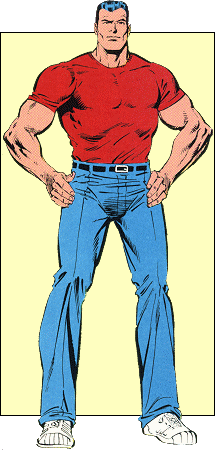John Byrne Explains Why 'Racebending' Doesn't Help THE FANTASTIC FOUR Reboot
The posting starts with an earlier quote from Byrne to suggest his racial attitudes:
How is it any different to take a White character and paint him/her Black? Nick Fury, to cite but one example, had to turn into a different character when he was painted Black.
Why not MAKE him a different character? Give him is own identity, instead of one handed down from on high by White folk? Make him Gabe Jones, or Gabe Jones Jr, or Gabe Jones III, if you want to tie into existing continuity. As the “Everything That’s Wrong With…” site so aptly points out, Fury in the Marvel Movies has no depth at all. He is defined entirely by the eyepatch.
It's a fine notion by itself, and it may lead to more minority characters in movies. In 25 or 50 years, when these characters become fan favorites. But how does it help integrate movies now?
It sounds like another way of saying, "Let's keep movies white until those uppity minorities have earned a seat at the table." Which ignores the fact that white creators pander to white fans in a racist feedback loop. That there's no "meritocracy" that gives minority characters a fair shot at becoming stars.
Marvel, champion of equality?
Byrne also gives us a pseudo-history of racial attitudes at Marvel in the 1960s:
When Johnny is race-swapped the inevitable response from some segments of fandom and the media is that this is “necessary” due to comics in the 1960s being hotbeds of White supremacy—while nothing is further from the truth. American comics had long been the home to some of the most liberal, forward thinking people you were likely to meet. They cannot be taken to task for portraying society as that society perceived itself. But they should definitely be lauded for being, often, ahead of the curve when it came to social reform.
Second, comics have always been on the trailing edge of social change. Movies such as The Defiant Ones (1958) tackled racial issues a good ten years before comics got around to them. I don't give comics much credit for belatedly changing after more progressive media embarrassed them into joining in.
Also note that Byrne's icons of equality, Wyatt Wingfoot and the Black Panther, aren't as progressive as he thinks they are. Both characters were members of super-scientific tribes that kept their advances hidden from the world. The implications of that are troubling.
What these comics told us is that these exceptional examples of Africans and Native Americans were the only ones worth mentioning. Perhaps one in a thousand of these nonwhite people were smart enough to be scientists or brave enough to be heroes. The rest weren't. Roughly 99.9% of blacks and Natives were apparently too stupid or scared to deserve depiction.

Aquaman the Aryan?
Another posting responds to the casting of Jason Momoa as Aquaman as well as Jordan as the Human Torch. It's excellent so read the whole thing, but here's a key excerpt:
Radioactive Blackness And Anglo-Saxon Aliens: Achieving Superhero Diversity Through Race-Changing
By Andrew Wheeler
That’s a direction the filmmakers could explore, of course. Even without exploring it, a justification could be made for Aquaman’s blondness or whiteness. In most tellings, Aquaman is half-human, and half-American, and maybe even half-Floridian, so there’s nothing saying he can’t be white and blond. Some humans, some Americans, and some Floridians are white and blond. (Many are not, but some are.)
Come to think of it, an in-plot justification isn’t really needed. If the character is white and blond, audiences won’t actually question it.
The Way of All Flesh-Color
This is cultural bias in effect. General (generally white) audiences never question why characters are white and blond. If a character could be white, that’s usually justification enough. Whiteness as default becomes logical and comfortable. Only non-whiteness requires an explanation.
Indeed, if a character is not white, some people will cry out that their racial identity is the product of political agenda-driven tampering. If a character is white, the same people will comfortably assume that he or she came out of the box like that.
It should be noted that we’re not even talking about the broad US census category of “white,” which covers people whose families hail from Europe, North Africa or the Middle East—including many people with tan, olive or ruddy skin.
In comics, whiteness is predominantly represented by the pale pink complexions of Northern Europeans—the color once problematically referred to as “Flesh” on Crayola crayons, until Crayola changed it to “Peach” in 1962. Real world white comes in many shades, but in comics all white people seem to trend towards hex color #FFCFAB. (Individual colorists may of course bring more nuance to their work, but how many white superheroes can you name who are consistently portrayed with bronze or olive-toned skin?)
Superhero comics don’t actually favor whiteness; they favor a subset of whiteness that borders on Aryan idealism. We ought to regard that as uncomfortably fetishistic, because it’s an aesthetic that the industry has chosen.
All fiction is manufactured. Authors make their worlds and choose what goes in them. It is always possible to contrive a fictional justification for a character looking whichever way the author wants, up to and including finding a way to make a white person the hero in a story about, say, feudal Japan, or ancient Egypt, or Persia during the Islamic Golden Age. A white hero is not the most likely scenario, but it’s always a possible scenario, so in that way it always becomes justified.
The decision to cast Michael B. Jordan as the Human Torch has been called out by message board posters as evidence of an agenda at work—but white heroes in these non-white settings are rarely called out as similar evidence of an agenda. It’s all artifice, it’s all contrived. Fiction exists in service to an author’s design. All fiction serves an agenda, whether it’s articulated or not.
Ironically, Momoa is something of an offender, taking Native roles in The Red Road and other projects despite his tiny amount of Native blood. Which shows how the prevailing narrative gets twisted. White characters are often blond and Aryan--a fact that's especially obvious on TV. But Native characters can be anyone with a tan.
For more on casting issues, see Natives Protest Tiger Lily Casting and Stand-Off Over Cry, Trojans!


No comments:
Post a Comment